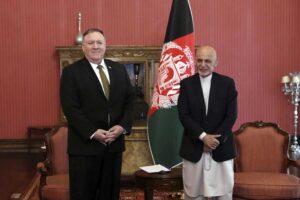
The National Interest Foundation Newsletter
Issue 38, March 26, 2020
Welcome to our latest edition of the NIF Newsletter. In this week’s headlines: Gantz is elected Knesset Speaker in a move that signals a power-sharing agreement with Netanyahu, we cover the latest developments with the ongoing coronavirus crisis in the United States, a Turkish court indicts 20 Saudi nationals in connection with the murder of journalist Jamal Khashoggi, the Trump administration slashes aid to Afghanistan after Secretary of State Pompeo’s visit, and India’s prime minister declares a nationwide lockdown for 21 days.
Gantz Elected Knesset Speaker

In a shocking turn of events, Gantz has been elected Knesset Speaker in a move that signals a power-sharing agreement with Netanyahu. (Photo from Reuters)
Gantz Elected Knesset Speaker, Signaling a Power-Sharing Agreement with Netanyahu
In a stunning twist to Israel’s current political deadlock, Benny Gantz nominated himself to be speaker of the Knesset and was elected, ahead of agreeing what appears to be a power-sharing deal with Prime Minister Netanyahu’s Likud government. As a result, Gantz’s Blue and White Party is on the verge of disintegrating as factions of the coalition break away in the aftermath of the controversial move. Gantz’s decision follows an Israeli Supreme Court ruling earlier in the week that ordered previous Knesset Speaker Yuri Edelstein to hold a vote to elect his successor. Edelstein rejected calls to do so, saying Israel’s High Court of Justice is interfering in the country’s politics, and doesn’t have the authority to order him to hold an election. Rather than comply with the court’s ruling, Edelstein resigned his position on Wednesday afternoon, which paved the way for Gantz’s move today.
Latest News on Coronavirus

Cases of the coronavirus continue to increase, as the federal government and local governments step up their responses. (Photo from NBC)
Latest Developments on the Coronavirus Crisis in the United States
Cases of the novel coronavirus have continued to increase, with positive tests reaching near 80,000 in the United States, and 500,000 around the world. Wednesday brought the greatest number of deaths in a single day due to the disease in the United States, with 223 people passing away. The federal government has taken steps to address the crisis, with the Senate unanimously passing a $2 trillion stimulus package on Wednesday. The House of Representatives is expected to take up and pass the bill on Friday, and leaders on both sides of the aisle are pushing for a unanimous vote to send it to President Trump’s desk to sign. State governments have also started enacting measures to prevent the spread of the coronavirus; the governors of Minnesota, Wisconsin, New York, California, Hawaii, Virginia, and others all signing slightly differing versions of stay-at-home orders, requiring citizens to only leave home for essential tasks.
Turkish Court Indictment

A Turkish court indicted 20 Saudi nationals in connection with the murder of Jamal Khashoggi. (Photo from Getty Images)
Turkish Court Indicts 20 in Connection with the Murder of Khashoggi
Prosecutors in Istanbul, Turkey indicted 20 Saudi nationals accused of planning and carrying out the murder of writer and activist Jamal Khashoggi in October 2018. Intelligence services around the world have long since concluded the architect of the murder was Saudi Crown Prince Mohammed bin Salman, who ordered a team of Saudi agents to abduct Khashoggi from the Saudi embassy in Istanbul when he went to collect paperwork to marry his fiancée. Named in the indictment are Saud al-Qahtani, former royal court advisor; and Ahmed al-Asiri, former deputy head of Saudi general intelligence. Both men have close ties to Mohammed bin Salman and are accused of orchestrating the plot at the crown prince’s behest. The indictment uses phone records, witness statements, and information from Khashoggi’s mobile phone and computer as proof of the Saudi plot against him.
Aid to Afghanistan

Secretary of State Pompeo visited Afghanistan to meet with rival leaders Ghani and Abdullah. (Photo from AP)
Trump Administration Slashes Aid to Afghanistan After Pompeo Visit
The Trump administration announced plans to cut $1 billion in aid to Afghanistan after the country’s two rival political leaders failed to agree on forming a new government. The move comes following U.S. Secretary of State Mike Pompeo’s visit to Kabul to meet with both Afghan President Ashraf Ghani and former Chief Executive Abdullah Abdullah. Ghani and Abdullah have each declared themselves president after a disputed election last year, and Pompeo was unable to break the deadlock between the two. In addition to cutting $1 billion of aid this year, Pompeo said that the United States is also prepared to slash another $1 billion next year. The continued political turmoil with Ghani and Abdullah comes at an inopportune time, as internal peace talks are slated to begin between the Afghan government and the Taliban. In a recent development, the two sides did agree to begin prisoner releases at the end of this month.
Nationwide Lockdown in India

Indian Prime Minister Narendra Modi ordered a full lockdown of the country for the next 21 days. (Photo from Reuters)
PM of India Declares a Nationwide Lockdown for 21 Days
Indian Prime Minister Narendra Modi ordered a 21-day lockdown as India begins to feel the impact of COVID-19. India currently has 519 confirmed cases of the coronavirus, and 10 people have died. So far, the world’s second-most populous country has avoided the full ramifications of the virus, and Prime Minister Modi is preemptively shutting the country down to stop any spread of the disease. India has also closed most of its international borders to people arriving from Europe. During the lockdown, only essential services will remain operational. Grocery stores, hospitals, water, electricity, and municipal services are considered to be essential. Places of worship are among the places closed for the duration of the lockdown, which is notable due to India’s recent civil unrest over religious freedom. There have been protests throughout India in recent months over contentious new legislation that discriminates against Muslims. Prime Minister Modi implored Indians to follow the government’s guidelines, and warned that without strict measures many Indian families would “be destroyed forever.”
